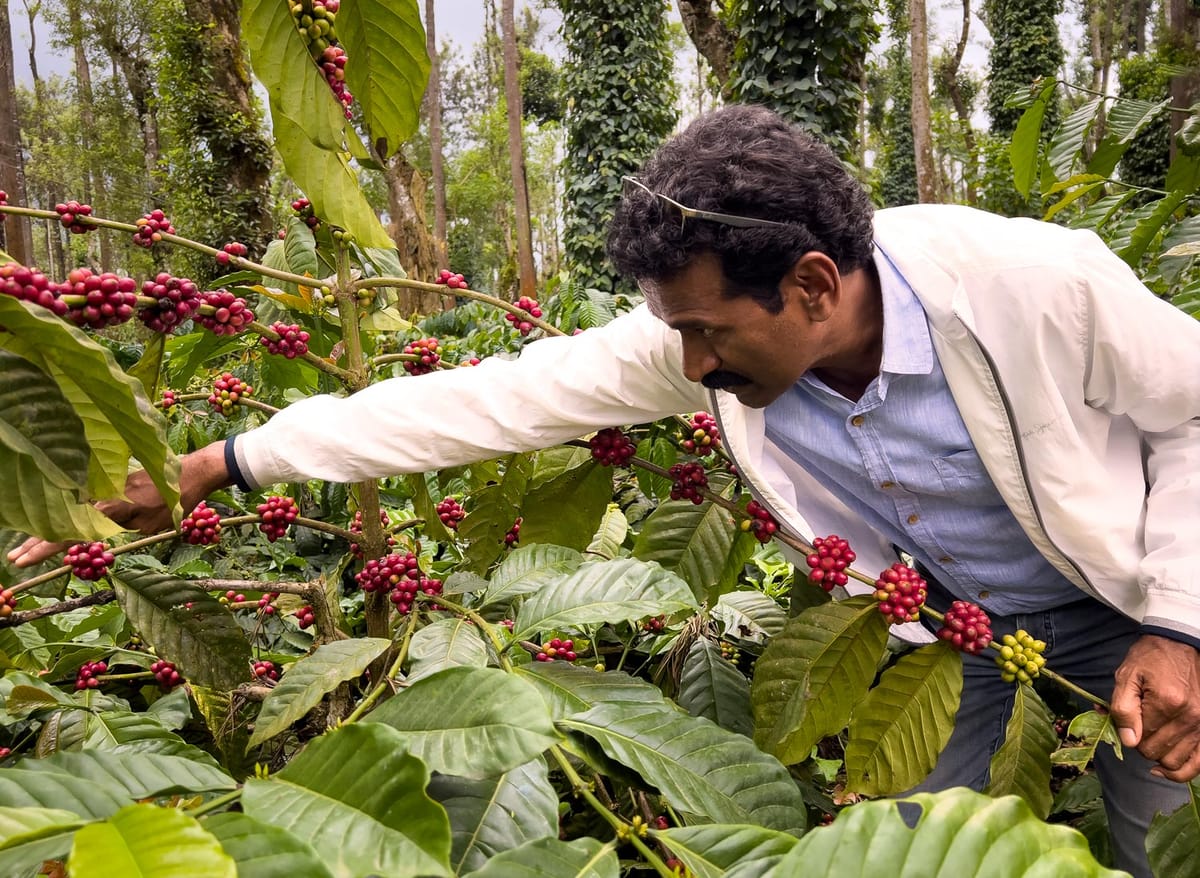With Modi in My Dreams, Getting Real About Coffee
Birds, peafowl, hare, fox, boar. Trees, plants, and vines. Every rich shade of green. Who in his senses will argue you have caused damage here?

Narendra Modi strode in last night and stayed and stayed in a dream that wouldn't end. Each time I came to and fell back to sleep, he was there, erect in a ceremonial seat, smiling, waiting.
The Prime Minister was tall and athletic, save a luxuriant protuberance in the middle. He looks so different than on television, and in pictures, I thought in the course of the dream. I surprised my sleepy self with the praises I'd had in store for him, and he took them all grinning and smiling, and glowing, growing taller in his high chair.
He was a guest speaker at a function organised at a hotel in (unmistakably) Mysore. I was a speaker, too. Neither of us delivered a Gettysburg Address, not even the oratorical champion Modi, so far as I can recollect. I'm trying my best to recall the content of the speeches, but everything's evaporated now when I've sat to write it down.
I woke up to rain, a steady light pouring that has coffee planters in the throes of existential angst.
What's coming next when I sleep? Will Narendra Modi invite me to coffee and dhokla at his official residence? Will I decline because the year-end is the busy time on the plantation, and Delhi is so cold in December? Will he say, "It's all right, Shashi! I understand. Let's do it another time."
Or will I go and be treated to overwhelming hospitality and sent off with a hug, and will I leave Modi feeling sore all over?
But I should accommodate Modi and his bidding in my dreams. A fancy for organic fertiliser (for all good reasons) has the government discouraging the import of chemical fertiliser. The Prime Minister has showered praise on "zero budget farming." So we are now paying ₹58,000 for a tonne of Yara — a Norwegian fertiliser that we use on our plantation — against ₹45,000 we spent for recent rounds. Besides the high price, dealers of farm supplies are warning of severe shortages coming, which signals the Sri Lankan experience coming over.
A decent estate that relies on chemical fertilisers uses about 900 grams of it for each coffee plant, fed in five rounds through the year. On top of that, the green manure that Indian plantations produce, from the trimmed branches of shade trees, from constant weeding, from trees felled by storm winds, is in the order of many tonnes. Their long-term benefit to the soil far exceeds the good and bad influence of 900 grams of chemical fertiliser that a coffee plant receives.
That's the argument put forth by progressive planters like Dharmaraj against a sudden, unplanned, total shift to organic manuring. They hold out the example of Sri Lanka. India will suffer a crisis just as devastating, Dharmaraj says. It is hard to counter him: Circumstances being what they are, is organic farming possible on the scale necessary to keep up with current demand? What about the cost? Organic agriculture will satisfy a few lifestyle consumers who will pay any price. What of the rest?
The truth, Dharmaraj argues, is that small doses of chemicals that we feed the plant are consumed and disposed of with no harm to humans and soil.
"Let the government make large-scale organic farming feasible before it creates shortages in chemical fertilisers. On our part, until then, let us focus on producing no-residue crops, which are crops that carry no residue when they leave the farm."
We do other things responsibly, besides. The plantations of the Tatas and other socially sensitive estates leave alone trees brought down by winds and storms. It does not matter what tree species they belong to — silver oak, mahogany, rosewood, teak. They are left to rot where they fell.
Sujaya has an alternate idea for our property. She is getting a wood chipper built at Coimbatore. She will feed it our waste wood and produce chips for mulch, better spreading more green manure.
So I should be happy to host Modi in sleep or meet him while awake and put forward what Dharmaraj and his cohorts press on me every time we meet. I should tell him the things we do to preserve land that's in our custody.
"See this humus!" Dharmaraj likes to say when we tour our plantation, poking the tip of his umbrella into the black wet soil, raking it. He points to the expanse, taking in what can be seen, sensing the rest. "Birds, peafowl, hare, fox, boar. Trees and plants and vines and every rich shade of green. Who in his senses will argue that you have caused damage here?"
I haven't reproduced Dharmaraj's delightful Kannada to full effect here. Out on the estate, old-time planters veer toward verse. Should these planters gather in my dream — they'll make a more compelling case before Narendra Modi.